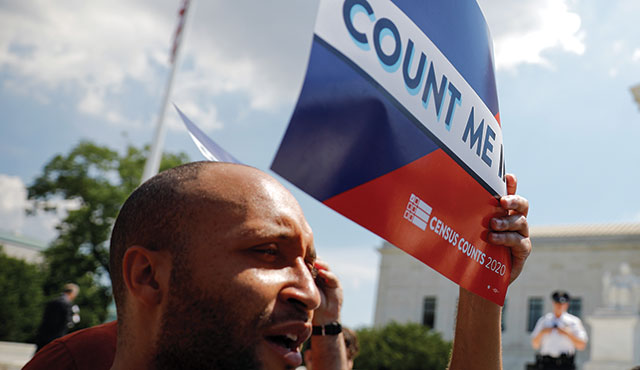Odd as may sound, something as secular as a census played a key role in the origins of modern Christianity. Through the ages, censuses have been important tools for societies and responsible for key events in the Old and New Testaments. According to the Bible, it was a Roman accounting that brought Jesus to a manger in Bethlehem.
Luke 2:1-5 in the Revised Standard Version, Catholic Edition reads: “In those days a decree went out from Caesar Augustus that all the world should be enrolled. This was the first enrollment, when Quirinius was governor of Syria. And all went to be enrolled, each to his own city. And Joseph also went up from Galilee, from the city of Nazareth, to Judea, to the city of David, which is called Bethlehem, because he was of the house and lineage of David, to be enrolled with Mary, his betrothed, who was with child.”
If not for that census, the origin of Christianity and Christmas traditions would be very different.
In modern times, the U.S. Census has become an important tool that goes far beyond mere counting. It is used for taxation and to track demographics and is a tool for social justice and equity.
For areas like those served by the Diocese of Orange, with its diverse and large undocumented population, a census is vital in bringing needed funds, services and a voice to underserved communities. For this reason, the diocese is working with the government in the upcoming count and has created a Census 2020 Committee to help ensure all are counted.
The government directs more than $2,000 per person in tax revenue to communities, based in part on census numbers. So, in short, the more people are counted, the more money is available.
“Census numbers are important for us to make sure we’re serving the people,” said Monsignor Stephen Doktorczyk, vicar general and moderator of the curia for the Diocese of Orange.
“The Catholic Church and other service providers rely on the national census to provide an accurate count in order to effectively serve those in need,” said the U.S. Council of Catholic Bishops in a statement.
Undercounting is a recurring problem in Orange County and Southern California, as many fear participating. However, it damages vulnerable populations.
Although personal information from the census is kept confidential and by law cannot be shared with other agencies or law enforcement, many still fear it and fail to respond. This can be due to being undocumented and fearing removal, coming from countries with corrupt untrustworthy governments or simply due to language barriers and insufficient outreach.
The Catholic Church is helping bridge that gap.
“As Catholics we believe in the dignity of every human person as the foundation of a moral vision for a society. And that is part of helping our neighbors and especially for those who are excluded,” said Greg Walgenbach, director of Life, Justice and Peace for the diocese.
“We are seen as a trusted messenger,” said Father Ed Poettgen of St. Boniface Catholic Church. “Along with schools and teachers, people can have some confidence in what we say.”
Every 10 years, the United States government conducts a census that strives to count all of the more than 327 million people in the country. All are legally required to participate. The next decennial census is in Spring 2020.
Census numbers help guide how and where $700-$800 billion in federal taxes are spent on schools, roads, hospitals, child care centers and senior centers. Data is used for spending on programs such as Medicaid, Special Education grants and numerous social programs for the poor and disadvantaged. It also is used for redistricting and apportionment of congressional seats and electoral votes and to monitor discrimination and civil rights laws.
As such, the census is beneficial to the diocese and the Catholic community.
“For us, it helps for planning: where we build, do we have enough resources in the right places?” Monsignor Doktorczyk said.
Censuses date back 6,000 years to the Babylonian Empire as a way to count not only people, but their wealth and belongings. They were also used through the years to gauge the number of adult men available to wage war. In the United States, full censuses have been taken since 1790.
The Church’s 2020 Census Committee has met with U.S. Census officials to prepare for the count, which officially launches with Census Day, April 1.
In coming months the diocese will convene parish leaders, assemble volunteer teams, distribute information including bulletin inserts, set up tables with information and materials and create questionnaire assistance centers.
Teams in hard-to-reach communities, will be used to help those populations participate.
“Our whole community benefits from everyone being counted,” Walgenbach said adding, “we have both a legal and a moral responsibility to take part for the sake of the common good.”
Or as Monsignor Doktorczyk put it, “Please be counted, because you count.”


